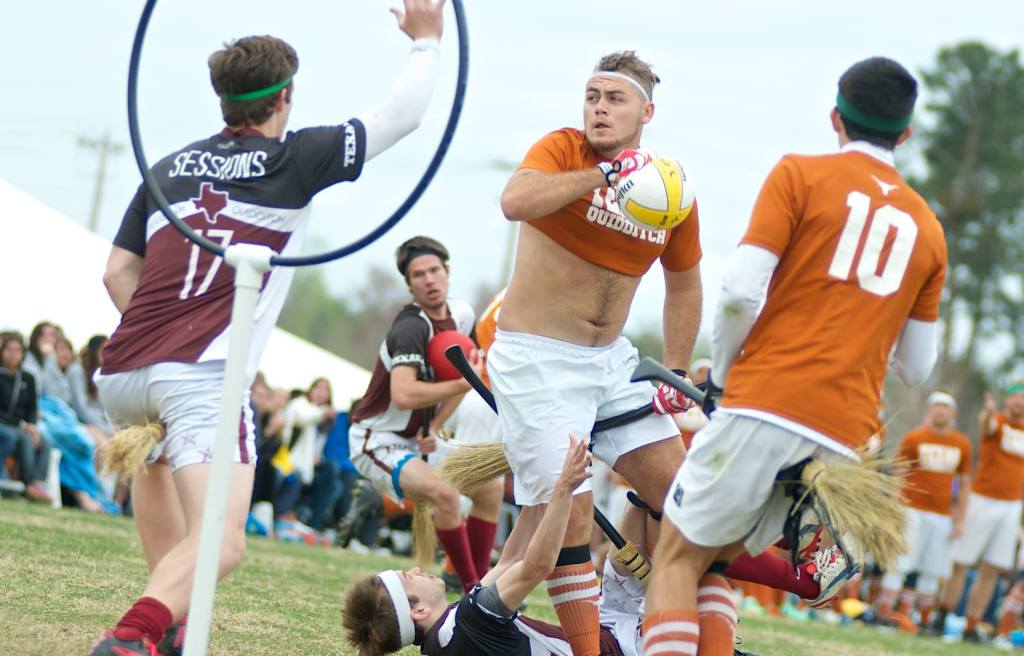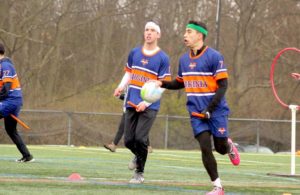- Rule, Britannia, no more?
- Unpopular Opinions: US Quadball Cup 2023
- Proven Contenders: University of Virginia
- Proven Contenders: Rutgers University
- Proven Contenders: University of Michigan
- Proven Contenders: Creighton University
- Different Perspectives: A Look Inside USA Ultimate
- Antwerp QC, Much of Belgian Core, Leaves Competitive Quidditch
Will They or Won’t They: University of Texas, #1

Credit: Michael E. Mason
In addition to our preseason rankings, The Eighth Man staff will be releasing a series of articles focusing on the top 20 teams, counting down from 20 to one. Each article will be written by two members of the staff, one who believes the team will live up to or exceed expectations and one who thinks they will come up short.
THIRD TIME IS ALSO A CHARM
By Beto Natera
The longhorn sits atop the mountain. From its enviable roost, the University of Texas has slain all comers in the past two years. While these 2014 champions did not eviscerate the competition in the same way their predecessors did, these Longhorns were nonetheless a joy to watch. Replacing numerous luminaries of the sport, players like Ryan Davis, Kenny Chilton and Audrey Wright stepped out of the shadow of the stars of the previous year’s team. They grew as leaders throughout the season and helped develop a new batch of stars on their way to a title.
So, why the history lesson? Because, I like to think we can glean something of the future from the past. Without the flowery nonsense, there be lessons in the past, yo! Namely, that the leadership of Texas quidditch knows how to train and develop a team. With much of last year’s leadership returning for a chance at a three-peat, I believe that Texas is only going to get better. Think of this program like University of Alabama’s football program. There is never a reloading period. Highly talented players are funneled into both programs and, using some of the best coaching in their respective games, coax that talent out from new recruits.
Yes, all three of the players I mentioned above were member of the 2013 title team. However, numerous players stepped up over the past season and developed into elite players. Margo Aleman is widely touted as one of the better seekers in the country after his World-Cup run. Davis, sparsely used during the original 2013 title run, has long been at the top of the list of most dreaded players to line up against during brooms up. Kaci Erwin, a virtual unknown a year ago, is now captaining this team after a season of getting the job done at female chaser. In addition to these veterans, Texas will also be adding players from last year’s Austin Quidditch roster. Jeremy Avelar, an offensive star for Austin, will only augment what was an already formidable chaser group.
The one question hovering around this team this season is the status of longtime captain and coach Augustine Monroe. Monroe is in the process of securing eligibility to play an additional season for the Longhorns. While his status will not be concretely known until the spring, my gut tells me that the man synonymous with Texas quidditch will return for another curtain call. While teams like Lone Star Quidditch Club can and will challenge Texas, no team has the same level of roster continuity and talent as the Longhorns. As a result, Texas has to be considered the front runner to win it all this year and, in the process, become the second team ever to three peat.
THE REIGN WILL END
By Luke Changet
The University of Texas is the best college program in quidditch. There can be no debate on that subject. Two consecutive World Cup titles, even after losing half of their roster to graduation and a top-tier community team in the area. They reloaded better than anybody could have ever expected, and while their regular season was not phenomenal, they brought it all together at the one tournament that matters most. The University of Texas comes into this season as the No. 1 ranked team in our polls, including a No. 1 vote from me. However, our polls were done before the release of Lone Star Quidditch Club’s roster, before any quidditch had been played this season and before anyone had anything to base this on. Ranking the University of Texas as the No. 1 team means that we expect them to win World Cup.
They will not.
Yes, we all thought the same thing last year, and they still pulled it off. We all thought the same thing the year before, and they still pulled it off. But this year, there is competition on a level that has never been seen before, and every single top competitor is dying to be the team to kill the dream of a three-peat.
Granted, any team with Augustine Monroe will always have a shot at going the distance. He is arguably the best leader in the game right now. He has taken two very different teams through some rough patches but wound up winning World Cup with both. This year, he has almost every key piece of his team back, suffering only the loss of Margo Aleman from said key pieces, which, while a big loss, is not one that will cripple the team.
But then you have to look at the competition. The only collegiate program that could hold a candle to Texas was Texas A&M. Texas A&M lost a lot of last year’s talent, and it all fed into Lone Star Quidditch Club. Last season, Lone Star was a stone’s throw away from being the best team in the world. Now that they have another handful of the best players in the world, I cannot see any team being able to beat them, especially after Lone Star has had a year to come together as a team and work out the kinks of being spread out geographically. Add to this the plethora of community teams popping up around the nation which are recruiting from the best of the programs in their area and have been for some time, and I think it will be incredibly tough for any college team to win World Cup. If anyone can do it, however, it is Texas. But the odds are stacked against them.
Looking at the loss of Aleman a little deeper, there is a problem that arises. The World Cup VII Texas team was not nearly as dominant as the World Cup VI team. They had to finish games in snitch range throughout bracket play and, had it not been for Drew Wasikowski suffering a sprained ankle in the semifinals, Texas A&M very well could have beaten Texas in quaffle points. Aleman gave Texas a safety net for those snitch-range games, making great catch after great catch. It is possible that Texas will find a replacement, but it is very hard to replace anybody that good. Add to that the fact that Texas’ beaters were not nearly as dominant as they were the year before, and you have a lot of questions raised about the snitch game.
On the note of beaters, Texas also has some questions there. In World Cup VI, Texas coasted through with exceptional beaters who locked down bludger control almost all game, every game. At World Cup VII, Texas played a more back and forth bludger game. As more and more teams are picking up on how to use their beaters effectively, Texas’ advantage shrinks more and more.
With Texas, anything is possible. However, with the surfeit of exceptionally talented teams popping up across the nation, the loss of Aleman and the rising knowledge and skill of beaters, this year’s University of Texas will have a much tougher road ahead of them and may only end up in the Final Four.



